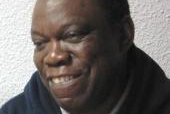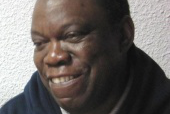Text: World AIDS Day homily by Fr Robert Kaggwa
Fr Robert Kaggwa, MAf, preached at a special Mass, yesterday, the eve of World AIDS Day, at the Church of Our Lady of the Assumption, in Warwick Street. A leading theologian, DR Kaggwa is the first recipient of the Cardinal Hume Fellowship at Cambridge's Margaret Beaufort Institute.
Dear Friends, Today we celebrate the eve of the World AIDS day. Light a candle for Justice is the theme and this reflects the UN World AIDS Campaign for 2002/3: Confronting Stigma & Prejudice. We gather in solidarity with all those who live with AIDS and with all those who have left us because of AIDS and all of us gathered here this afternoon pray in hope. It is quite significant that we are celebrating this on the First Sunday of Advent. Advent is the beginning of hope. The days are coming, says our God, when I will fulfil the promise I made on the house of Israel and Judah. We await the God of Justice, as we have just heard in the first reading. This God who comes gives us the strength to love one another and to banish all discrimination among us. St Paul has prayed for us in the second reading: "may our Saviour Jesus Christ increase you and make you overflow with love for one another and for all people, even as our love does for you." The Gospel reading announces Christ's coming. But unlike the two first readings the gospel begins with a sombre, even frightening tone. Moreover, Jesus uses terms that make it extraordinarily frightening - signs in the sun, the moon and the stars -- all kinds of violence and suffering. He describes a time of terrible evil. This is a special kind of language used in the scriptures -- apocalyptic language. It is a language filled with symbols. If we apply the symbolic language literally, we will misunderstand what is being taught.
The symbols are almost like a code that the people use at times of oppression. Jesus, in the Gospel today, spoke in similar terms -- in symbolic language. I think we have to understand that he was speaking out of his own fear of what was going to happen to him. Remember, this was the last week of his life, and he was aware that people hated him and were going to abuse him, torture him and kill him. This could have been a time of despair for Jesus. But he spoke in apocalyptic terms, saying: Even though it seems that everything is coming apart, that earthquakes and floods will destroy the world, that violence, terrorism and war will destroy everything -- will destroy me -- I (Jesus) have hope because I have deep confidence in God that it will not be the end. "People will see the One who is to come in the fullness of his glory," Jesus said. He was aware that God was going to be with him no matter what happened. But this message of Jesus must be linked to his vision: the vision of God's reign. At the beginning of Jesus' preaching: 'The Reign of God is at hand, repent and believe in the Good News' (Mk1:15). That's what you and I are expected to do if we are going to break forth into the reign of God right now. We can do it -- each of us individually and all of us as a community. The reign of God is at hand. It will happen when each of us begins to act justly, and only with love.
The reign of God will begin to expand within my own life, and I will know the peace, the joy and the love of Jesus so that I can carry that into the world wherever I go. Then the reign of God will begin to break forth everywhere. I think it is important today as we are 'lighting a candle for justice' to remember that the reign, the Kingdom of God that Jesus is speaking about is one in which God's justice reigns.
It is important to reaffirm this today especially when a lot of prejudice is growing both in the Church and society. We hear groups of people being written off as bad guys. We hear both political and religious leaders using a rhetoric of 'good guys, bad guys', a rhetoric of discrimination.
According to this rhetoric, it is so simple, the world is neatly divided into just two groups: the bad guys and the good guys - implying that those who use this rhetoric are themselves the 'good guys'. However, if we watch the people on the street on their way to work, to school, or to do their shopping, there is no way one can divide people into 'good' and 'bad'. They are all mixed bags and that's what we all are. That being the case, there is no way God can divide them into 'good guys' and 'bad guys'. Then there must be really something wrong with the 'good guys' and 'bad guys' politics. I wonder whether as Christians we can continue buying this rhetoric of dualism, hatred and division that has crept into society these days. I think in the name of Jesus, in the name of this man from Nazareth, this politics of 'good guys' and 'bad guys' has to be challenged. And the Good News is that Jesus himself challenged this type of thinking.
They were sinners. They were bad guys. Jesus breaks all these taboos and heals the man. The society in which Jesus lived and exercised his ministry was characterised by deep divisions mainly based on social status, gender and purity laws. This meant that Palestine operated with an elaborate purity system that excluded the majority of the people particularly, women, the sick, non-observant Jews, the untouchables and those who touched them and the Gentiles. In other words we can see a society that was clearly divided into good and bad people, clean and unclean, touchable and untouchable and so on. The dualism of good and bad guys was part of the system. It was the politics of holiness, the politics of the pure. On the contrary Jesus replaced this politics of holiness with the politics of compassion.
When we read the gospels, we see that Jesus is never alone. He is always surrounded by people of every description. In fact the women and men that Jesus reaches out to are referred to in page after page of the Gospels by a whole variety of terms: The poor, the blind, the deaf, the dumb, the lame, the crippled, the paralysed, the maimed, the lepers, the epileptic, the diseased, the possessed, the sinners, the children, the bereaved, the broken-hearted, widows, foreign women, beggars, unemployed, toll/tax-collectors, prostitutes, gentile soldiers, the crowds, the rabble or uneducated peasants that were ignorant of the Law - in other words, all those who "laboured and who were overburdened", the least, the last and the lowest, the destitute, the despised, the despairing, the left-overs, the expendables - "the lost sheep of the house of Israel" - the bad guys!
I think our coming together today is of such great significance. We are very different individuals and diverse groups but we are all united in prayer and reconciliation. Historically many of us have not listened or spoken to each other before. The praxis of reconciliation is a key instrument in confronting stigma and discrimination. The inclusive diversity of groups, represented in supporting this event is a prophetic witness to the wider Church and society: that when all are welcome, powerful things can happen. That African groups working on HIV can listen to the experiences of gay men in the pandemic and vice versa. That local communities in Great Britain can begin to confront their own racism and that minority ethnic communities can begin to confront their own silence over diverse sexual orientations in their various contexts.
There is a story about an old Rabbi who once asked his disciples how they could tell when the night ended and the day began. The disciples scratched their heads. "Could it be," asked one student, "when you see an animal in the distance and know whether it's a sheep or a dog?" "No," replied the Rabbi. "Could it be," another asked, "when you look in the distance and can tell whether it is a fig tree or a peach tree?" "No said the Rabbi." "Well then, when is it?" his pupils demanded to know. "It is when you can look at the face of any man or woman and see that he is your brother or she is your sister. Because if you cannot do this, then no matter what time it is, it is still night."
The message of today's scriptures, then, isn't really a message of despair, sadness and fear. It is a message of hope, love and joy. I hope we can hear that message and live it from now on.




















